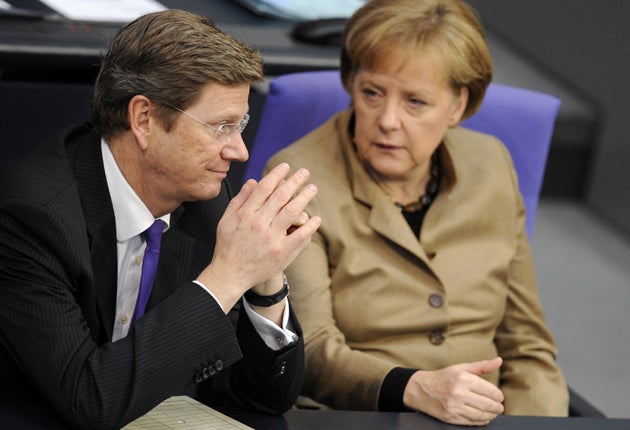Merkel's 'dream team' begins to unravel
Criticism mounts of her coalition partner, liberal leader Guido Westerwelle

Your support helps us to tell the story
From reproductive rights to climate change to Big Tech, The Independent is on the ground when the story is developing. Whether it's investigating the financials of Elon Musk's pro-Trump PAC or producing our latest documentary, 'The A Word', which shines a light on the American women fighting for reproductive rights, we know how important it is to parse out the facts from the messaging.
At such a critical moment in US history, we need reporters on the ground. Your donation allows us to keep sending journalists to speak to both sides of the story.
The Independent is trusted by Americans across the entire political spectrum. And unlike many other quality news outlets, we choose not to lock Americans out of our reporting and analysis with paywalls. We believe quality journalism should be available to everyone, paid for by those who can afford it.
Your support makes all the difference.The parties in Angela Merkel's increasingly embattled government were struggling to digest their worst popularity rating in nearly a decade yesterday, less than six months after the German Chancellor had described her ruling alliance of conservatives and liberals as the country's "dream" coalition.
The damning appraisal came from the Forsa poll group, which found that a massive 84 per cent of Germans thought that Ms Merkel's coalition partners were locked in perpetual dispute. Only 8 per cent believed that the government showed unity of purpose.
The popularity of Ms Merkel's conservatives has sunk two points to 33 per cent, while that of her liberal Free Democrat coalition partners has fallen to a mere 8 per cent. Stern magazine, on whose behalf the poll was conducted, concluded: "The two parties used to be regarded as natural partners, but their popularity has now sunk to its lowest level in nine years."
Ms Merkel has herself been the target of mounting criticism since forming her new coalition last year, on matters from her leadership to her judgement.
However Ms Merkel's own shortcomings – a term which only a year ago would never have been used in connection with Germany's first woman leader – pale when compared to her chief partner in government: Germany's gay liberal leader, Guido Westerwelle, who is also both Foreign Minister and Free Democrat Party chairman.
The abrasive Mr Westerwelle was ridiculed in the media and elsewhere last September when he refused to answer a question in English that had been put to him by a BBC journalist. Since then hardly a week has gone by without his attracting negative attention.
Buoyed up by one of his right-wing liberal party's best electoral performances, Mr Westerwelle has been engaged in a bitter dispute with the conservatives over the tax cuts which he pledged to introduce during his campaign. But these have been dismissed as "unrealistic" by the conservatives.
The issue came to a head last month when Germany's constitutional court ruled that the low amounts paid out under the country's hugely unpopular social security system – known as Harz IV – were inadequate. Mr Westerwelle was again widely criticised for claiming that Germany had become a country of "late Roman decadence" in which the unemployed were better rewarded than those who went to work.
Mr Westerwelle has also failed to score many popularity points for the government as Foreign Minister. His main claim to fame has been to encourage the removal of all remaining US nuclear warheads from Germany. Many argue that such an initiative harks back to the early 1980s and is almost irrelevant today.
If that were not enough, Mr Westerwelle was yesterday again under fire for allowing Michael Mronz, an events manager who is his gay partner, to accompany him on his current whistle-stop tour of Latin America. Mr Mronz was said to have used the tour to tout for business. But Mr Westerwelle refused to accept criticism and insisted that his partner had paid for himself.
Ms Merkel has clearly sensed that her coalition with the liberals has failed to produce the dream-team results she expected six months ago. With key elections in North Rhine-Westfalia – Germany's most populous state – less than two months away, she has refused to be drawn into a damaging public row with the liberals. Instead there are suggestions that she is preparing to ditch them. Ms Merkel's party is already working out plans to join forces with the environmentalist Green Party in the state.
Last week she dismissed as "nonsense" the idea that such a coalition might work at a national level, but, as one commentator remarked yesterday: "Her reaction was so heavy that she seemed to have been caught red-handed planning such an alliance." Already, 46 per cent of Germans think that a conservative-Green coalition would be better for their country. By contrast 62 per cent think that conservatives and liberals "simply don't fit together".
Subscribe to Independent Premium to bookmark this article
Want to bookmark your favourite articles and stories to read or reference later? Start your Independent Premium subscription today.
Join our commenting forum
Join thought-provoking conversations, follow other Independent readers and see their replies
Comments